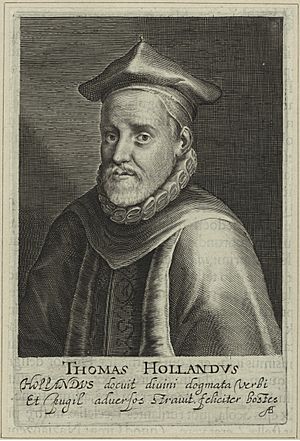Thomas Holland (translator) facts for kids
Quick facts for kids
Thomas Holland
|
|
|---|---|
 |
|
| Born | c.1549 Ludlow
|
| Died | 17 March 1612 Oxford
|
| Nationality | British |
| Known for | Translator of the King James Bible
Robert Dudley's personal chaplain. Skilled disputant. "An Apollo of the Scriptures." |
| Parent(s) | John Holland |
| Relatives | Anne Gunter |
Thomas Holland (born around 1549 in Ludlow, Shropshire, and died on March 17, 1612) was an important English scholar. He was a religious expert who followed the Calvinist branch of Protestantism. He is best known for being one of the people who helped translate the famous King James Version of the Bible.
Contents
Who Was Thomas Holland?
Thomas Holland was born in Ludlow, Shropshire, in 1549. His father was John Holland. He had an older uncle named William Holland, who lived in Burwarton. There was another Thomas Holland, his cousin, who was born in 1550. Because they had the same name and were close in age, people sometimes got them mixed up. Both cousins even died in the same year, but a few months apart.
Holland's Time at Oxford and in the Netherlands
Thomas Holland moved to Oxford in 1569 to begin his university studies. He quickly earned his first degree, a Bachelor of Arts, from Exeter College, Oxford in 1570. People called him a "prodigy" because he learned things so quickly and deeply.
Three years later, in 1573, he became a chaplain-fellow at Balliol College, Oxford. He earned his Master's degree in 1575. Later, he became a Bachelor of Divinity in 1582 and a Doctor of Divinity in 1584.
Serving Robert Dudley
From 1585 to 1587, Holland left Oxford to work for Robert Dudley, 1st Earl of Leicester. Dudley was appointed governor of the Netherlands. He was a strong Protestant and used Holland to help keep religious order among his soldiers. This two-year mission ended without much success in battles. However, Queen Elizabeth I rewarded Holland for his service to Dudley.
Returning to Oxford
After returning to Oxford, Holland received important positions. He became the Regius Professor of Divinity in 1589. This was a very respected teaching role. In 1590, he also became a canon at Salisbury Cathedral.
In 1591, he became the rector of St. Nicholas Church in Rotherfield Greys, Oxfordshire. From 1592, he served as the Rector of Exeter College. One of his notable students was John Prideaux, who later became a bishop.
Thomas Holland's Family Life
Thomas Holland married Susan Gunter on July 22, 1593. They had six children together, three sons and three daughters. All their children were christened in North Moreton (which was then in Berkshire) between 1594 and 1601.
- Anne (born 1594): She was named after Thomas's mother-in-law, Anne Gunter. Anne married Dr. John Whetcombe, who was a vicar and a former student of Thomas.
- William (born 1595): He studied at Exeter College, Oxford. William later became a captain serving King Charles I.
- Brian (born 1597): He was named after Thomas's father-in-law, Brian Gunter. Brian also studied at Exeter College, Oxford and became a minister. He moved to Long Wittenham.
- Edward (born 1599): He studied at Corpus Christi College, Oxford. Edward later earned a Doctor of Philosophy degree.
- Marie (born 1600): She was Thomas's second youngest daughter.
- Susanna (born 1601): She married John Vernon, who was a rector.
Translating the King James Bible
In June 1604, a big project began in England. Fifty-four of the country's best language experts and scholars were chosen. They were divided into six groups to translate the Bible into English.
Thomas Holland played a very important part in this project. He was a member of the "First Oxford Company." This group was in charge of translating the books of the Old Testament prophets, from Isaiah to Malachi. Their goal was to create an official version of the Bible, known as the King James Version, for use in churches.
The King James Bible was published on May 2, 1611. Thomas Holland died about ten and a half months later, at the age of 63. He was known for strongly opposing new religious changes that some people tried to bring into Oxford.
Holland was buried in the church of St Mary's church in Oxford. There is a portrait of him in the Bodleian Library. Another portrait of him is in the National Portrait Gallery, London. It has a Latin phrase that means, "Holland taught the teachings of God's Word and fought against enemies, successfully throwing them down."
The Case of Anne Gunter
While Thomas Holland was working on the Bible translation, he became involved in a strange case. His sister-in-law, Anne Gunter, and her father, Brian Gunter, claimed that local women had used witchcraft to curse Anne.
The case went to a special court called the Star Chamber. Thomas Holland was called as an expert witness. He did not believe that Anne was possessed by the devil, even though she claimed she could read with her eyes closed. It was later found out that Anne's father had made up the story. He had a grudge against a local family.
Thomas Holland's Writings
Thomas Holland also wrote some works himself. These include:
- 'Oratio habita cum Henricus Episc. Sarisburiensis [i.e. Henry Cotton] Gradum Doctoris susceperit,' Oxford, 1599, 4to.
- 'Πανηγυρίς D. Elizabethæ Reginæ. "A Sermon preached at Pauls in London the 17 of November, 1599. Whereunto is adioyned an Apologeticall Discourse for observing the 17 of November yeerely in the form of an Holy-Day," Oxford (by Joseph Barnes), 1601
 | Anna J. Cooper |
 | Mary McLeod Bethune |
 | Lillie Mae Bradford |


